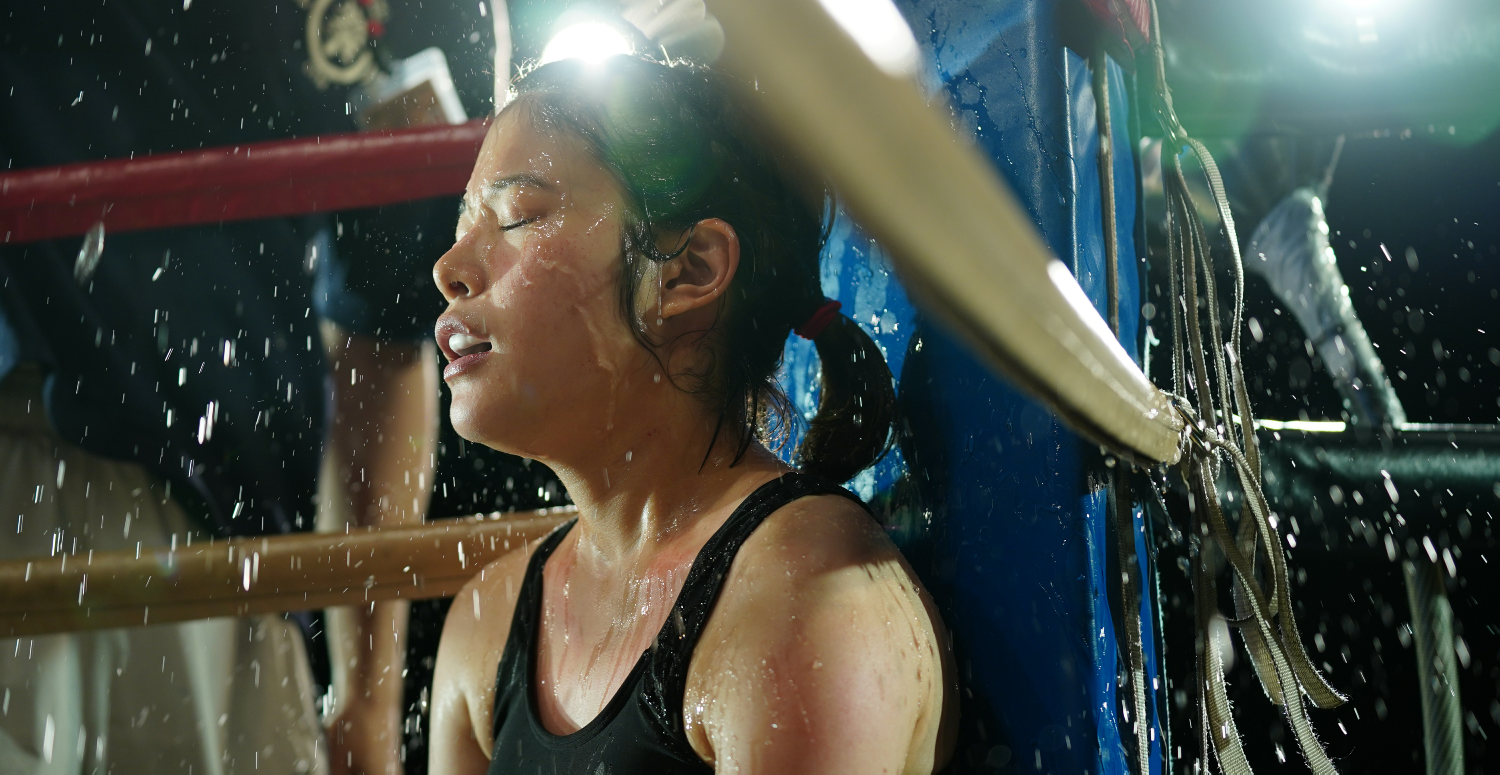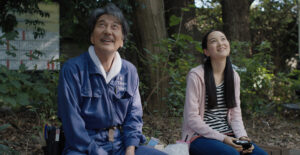La Beauté du Geste
ケイコ目を澄ませて
Keiko, me wo sumasete
(Small, Slow, but Steady)
2022/2023

FR EN
Un film de boxe pas comme les autres.
Nous sommes habitués au film de boxe vu comme un vrai spectacle où le sportif s’entraîne sans relâche et doit faire preuve de courage et de résilience pour affronter son adversaire dans un ultime combat épique. Le cinéma de ring est ainsi fait de bruit, de fureur et de sueur, mais pas celui-ci. « La beauté du geste » s’en distingue tout d’abord avec un rythme lent bercé par de rares dialogues et un recours systématique aux plans fixes. La pellicule 16mm de Yuki Tsukinaga dans une lumière douce et souvent nocturne renforce une atmosphère plus mélancolique et sensible. C’est un peu en cela un ‘anti-Rocky’ où le personnage, jeune poids mouche aux prémices de sa carrière professionnelle, est déjà las de se battre. Les combats y sont chorégraphiés comme des corps-à-corps anti spectaculaires où la ‘beauté’ du geste réside plus dans la répétition de l’effort physique.
Mais l’autre originalité de cet attachant film japonais concerne le personnage de Keiko interprété avec subtilité par Yukino Kishii. Une femme dans le monde de la boxe, on avait déjà vu ça dans l’excellent « Million Dollar Baby » de Clint Eastwood, mais c’est ici sa surdité qui représente l’enjeu principal. Boxant exclusivement contre des valides, elle se met naturellement plus en danger et doit trouver d’autres moyens pour s’exprimer et interagir avec le monde qui l’entoure. Sourde, c’est donc avec le corps qu’elle s’exprime dans tout un langage mutique saisi avec délicatesse par le réalisateur dans un cadrage captant les moindres gestes et regards qu’elle échange avec son mentor.
Sélectionné à la Berlinale 2022, le nouveau film de Shô Miyake s’inspire librement de la biographie de la boxeuse japonaise Keiko Ogasawara. C’est une étude de personnage au travers de la pratique d’un sport qui lui est a priori peu adapté et qui chronique avec empathie la relation entre une boxeuse hors norme et son coach patient, deux personnages las de leur vie qui traversent chacun une étape et dont les séances d’entraînement intuitivement communicatives transmettent la constance et le contrôle de soi. Le vrai combat qu’affronte Keiko est sa quête de sens, ou comment trouver sa place dans la société. Le film fait ainsi le portrait d’une solitude dans une banlieue quasi-vide de Tokyo (alors en plein Covid-19) et utilise la boxe tantôt comme un objectif, tantôt comme une entrave … un catalyseur de changement dans une étape de vie.
A boxing film like no other.
We’re used to the boxing movie as a real show, where the athlete trains relentlessly and must show courage and resilience to face his opponent in a final epic fight. The cinema of the ring is made of noise, fury and sweat, but not this one. “Small, Slow, but Steady” stands out from the rest, with its slow pace, sparse dialogue and systematic use of still shots. Yuki Tsukinaga’s 16mm film, with its soft, often nocturnal light, lends a more melancholy, sensitive atmosphere. It’s a bit of an « anti-Rocky » film in which the character, a young flyweight in the early stages of a professional career, is already weary of fighting. The fights are choreographed as anti-spectacular hand-to-hand combat, where the « beauty » of the gesture (as it is entitled in French) lies more in the repetition of the physical effort.
But the other original aspect of this engaging Japanese film is the character of Keiko, played with subtlety by Yukino Kishii. We’ve already seen a woman in the world of boxing in Clint Eastwood’s excellent “Million Dollar Baby”, but here it’s her deafness that is the main challenge. Boxing exclusively against non-disabled people, she naturally puts herself in greater danger and has to find other ways of expressing herself and interacting with the world around her. Being deaf, she expresses herself with her body, in a mute language delicately grasped by the filmmaker, who captures the slightest gestures and glances she exchanges with her mentor.
Selected at the 2022 Berlin Film Festival, Shô Miyake’s new feature is loosely based on the biography of Japanese boxer Keiko Ogasawara. It’s a character study through the practice of a sport that is seemingly ill-suited to her, and chronicles with empathy the relationship between an unusual boxer and her patient coach, two characters weary of their lives who are each going through a milestone, and whose intuitively communicative training sessions convey steadfastness and self-control. Keiko’s real struggle is her quest for meaning, or how to find her place in society. The film thus portrays a lonely life in a near-empty Tokyo neighborhood (then in the midst of Covid-19), and uses boxing as both a goal and a hindrance… a catalyst for change in a stage of life.

